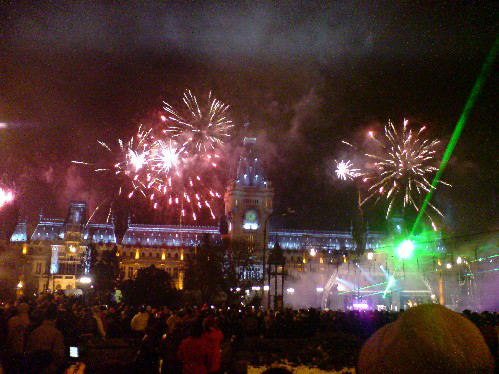Hot and cold Romanian welcome for 2009
The Romanians warmed up the cold weather with traditional games, fireworks and a lot of champagne. The snow didn’t stop them to welcome 2009 dancing at the outside concerts.
> Diana-Adela Ionita (Universitatea Alexandru Ioan Cuza)On the 31st of December, people went from house to house to wish Happy New Year. They wore masks and special costumes and play traditional games as ‘Capra’, ‘Calusul’ or ‘Ursul’. These are supposed to ironically imitate the bad characters from the city or village, to bring a good fruitful year for the cultivators, and to purify the house and land. One of the actors dresses like a goat (‘Capra’), horse (‘Calusul’) or a bear (‘Ursul’) and makes a special dance. The others are dressed as well as various story characters. All of them made noise, reciting the merry lyrics, playing the accordion, the little whistle, the drums and even the violin. Some of the people also went with ‘Plugusorul’, a traditional rhythmic poem, similar to a satirical extempore verse, which must be uttered in the New Years Eve. The lyrics are a magic invocation, which speak about all the phases of the cyclic agrarian process and becomes happier until the end. The text has to be emphasized by sounds like hollers, bells, whip crack, and, of course, by the typical instrument-‘buhaiul’-, which imitates the lowing of ox.
Romanians believe that if someone dresses with new red clothes and have money in a pocket will be lucky all year. Also, it is recommended that people don’t through the garbage in the first day of the year, so that they won’t through away their luck. Another superstition says that no one should cry on this day, nor borrow money. Romanians believe that it brings bad luck to put a new calendar before the year starts. The noise made at midnight with music, petards and fireworks chase the malefic spirits. In the evening of the last day of 2008, people went in the main square and enjoyed a concert. At midnight, they watched the fireworks, drank champagne and made a wish. Then, they went to a restaurant or home to have a special dinner with family and friends. They ate special traditional cheese pies which have in the interior a funny poem. The message ends with congratulation for the New Year.
In the morning of the 1st of January, they put coins- preferable of silver- in the water used for washing the face, so that they would be healthy all year. On first day of the New Year, people went with ‘Sorcova’. The name of the tradition comes from the Bulgarian word ‘surov’ which means ‘green, fresh’. The persons go from house to house with a branch with new leaves or a Christmas tree branch, decorated with colored paper flowers. This plays the role of a magic wand and is supposed to make come true the text which must be rhythmic said. Also, while singing, the persons have to through corn, seas or rice in the direction of the one who welcomes them. In the villages, the old people still tried to predict the weather forecast for the New Year. They put salt on twelve halves of onions, one for each month. In the morning, the ones with more water will be rainy. This way of knowing the weather was used in the past, mainly by the cultivators and farmers.

Multimédia